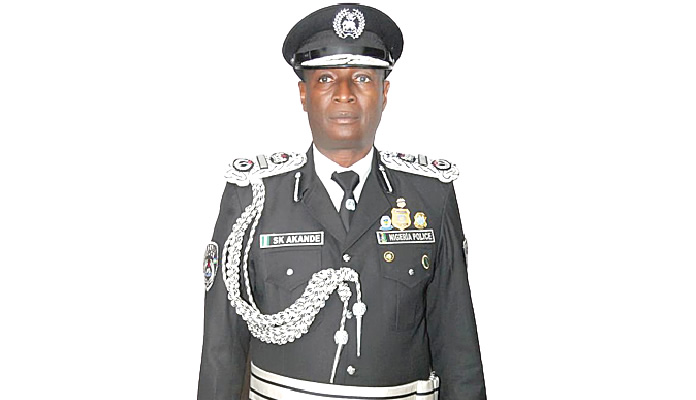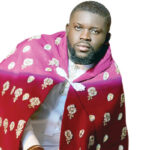
Sikiru Akande, former Assistant Inspector-General of Police in charge of Zone XI, Osogbo, Osun State, tells BOLA BAMIGBOLA what life in the Force taught him
You joined the Nigeria Police Force as a cadet Assistant Superintendent of Police in 1990. As the son of a former policeman, what type of family did you have?
I was born on May 29, 1963. I have always counted myself very lucky because first, I had a fantastic family that was built on human development. I grew up in a home where service to humanity is paramount to all of us. I grew up knowing what service to humanity is all about. It is not an accident that I took up a job with the Nigeria Police Force. It was a decision taken so that I can serve humanity fully. I attended Victory Primary School, Oke Ado, Ibadan, Oyo State. In school, I learnt about competition because I was always in the B class, and in the B class, pupils were expected to outshine those who were in the A class. So, I learnt about competition very early in life, wanting to excel at all times. That helped me greatly. After Victory Primary School, I attended Christ Apostolic Grammar School, Ibadan. At the school, we were taught how to be religious. That made me spiritual, waking up in the morning, and doing morning devotion and I was lucky that I worshipped then with great minds among whom are Pastor W. Kumuyi, who always came from the University of Ibadan to fellowship with us in the school, not minding the fact that I was born a Muslim. From Christ Apostolic Grammar School, I learnt what Christianity is all about, having a background in Islam. So, growing up was a wonderful experience.
Did you spend most of your childhood in Oyo State?
Luckily, Ondo State was created and my father was made an Assistant Commissioner of Police. So, he moved me to a great school called Egbe Oba High School, Ikole. At Egbe Oba, we were known for sports because Chief Ade Adefarati, who was our principal, knew that we could not compete with other great schools in Ondo State educationally then, no matter the percentage of academic excellence we tried to achieve.
So, he (Adefarati) keyed into sports. My secondary school had one of the most fantastic sporting facilities that a secondary school at that time could have. At Egbe Oba, I learnt how to relate very well with other people from other places in Nigeria because the school presented a team from all tribes, religious backgrounds and other facets of human endeavours, and that is why we were not surprised when the Federal Government eventually took over the school.
You are a graduate of the University of Benin where you had your first degree. What were your undergraduate years like at UNIBEN?
I entered UNIBEN in 1983 and graduated in 1987, bagging a Bachelor of Science degree in Political Science. Aside from schooling, I captained the University of Benin’s volleyball team at the 1986 universities games. That was a team that had no stars compared to universities like Bayero University, Kano; Ahmadu Bello University, Zaria; and the University of Ibadan, which had boys who were playing for the national team. But we proved our mettle.
You said your dad was a police officer. How did that influence your choice of career?
Yes, my choice of career was influenced by my dad’s work. Also, in 1972, I had the opportunity to attend a function. It was the visit of the then Commissioner of Police, Western State, F. H. E. Brisbee, to Ondo Province. My dad was the Ondo Provincial Police Officer. The regality of that event stuck in my young mind. I was just about nine years old at the time. I told my dad then that whatever it would take, I would become a police officer. So, from when I was a small boy, I knew I was going to be a policeman. I would have been part of the first set of cadet officers in 1988 but because the school I attended had a crisis towards the end of our education, we had a spillover. Before I completed my National Youth Service Corps programme, the first set of cadet officers at the Police Academy had already resumed.
What did you do?
I stayed back for two years working with my mother. However, despite all the opportunities that came, I stuck to my decision to become a policeman. So, when the opportunity of Course 290 came, I put in everything that I needed to do and luckily for me, I had known the then Inspector-General of Police. I had known so many police officers. So, approaching them that I wanted to be a police officer was not a problem and everybody who had a role to play helped me to achieve that dream. In fact, I can’t forget that an AIG, immediately I showed my intention, said, ‘Yes, the greatest people who can be future police officers are the children of police officers who have reputations’.
Looking back to your years in the Force, do you feel fulfilled?
I am more than fulfilled. There was no challenge or mandate I was given that I did not carry out successfully. I have never been a failure. Even when people didn’t give me a chance, I did creditably well. When I left the Presidential Task Force on Financial Crimes, I served as Police Public Relations Officer and as a personal assistant to three Commissioners of Police at the Bauchi State Police Command. We made our mark. If you go to the Bauchi State Police Command today, you will find a library there that serves the people and the police.
That library was created when I was the Public Relations Officer because there was a need for us to interact closely with the public. It is when you interact with people that you will understand how they feel and you can provide solutions to their challenges.
But if you allow people to stay away from you, they will hoard information that you need to get your job done. While in Bauchi, we built a robust police public relations template and when I was leaving, I felt fulfilled.
I went to Kosovo in 2000 for peacekeeping. The Albanians and the Serbians were at each other’s throat, but in all the places I served, I was able to broker peace in communities. When I returned home, I served at the National Assembly. I served as a pioneer member of Mopol 44 in Abuja and as the Second-in-Command, Mopol 44. I was tasked with ensuring that there was safety of lives and property within the FCT Command at night time. There was no incident that my team did not respond to. There was no incident that we did not handle appropriately. We stabilised the FCT security towards the end of 2002 before Inspector-General of Police, Tafa Balogun, was appointed and from there. I had the privilege to work with Lawrence Alobi, who was in charge of Federal Operations.
Can you describe your first experience handling a firearm?
My first experience was as a young officer. I was in charge of patrol and guard in Suleja. Suleja then was a developing community, near Abuja. So, the majority of the workers who were working on the development of Abuja were living there. Because of the daily pay that most of the Julius Berger workers then got, we had criminals coming from neighbouring states wanting to come and rob. On about three or four occasions, we had shoot-outs.
How did you avoid being hit during those occasions?
When you are working for God and you are tactical in whatever you are doing, you will face a challenge, but you will always conquer it. Throughout my career, there was one challenge or the other. In Liberia, it was hectic but we survived.
In the course of duty, did you ever have a reason to shoot and kill someone with your firearm, and did you ever regret any of such actions?
In handling firearms, there is what we called Course Order 237. It states clearly on what grounds you can use firearms to protect yourself or to protect the people. I did not shoot anyone who was not armed. I did not shoot anyone on the run, but if someone points their weapon at me, I would be a stupid person not to retaliate or to act faster. In the rules of engagement, why did God drive Adam and Eve away from the Garden of Eden? It is because they went against His rules. There are limits to which religion will make you shy away from dealing with any situation that God himself has given you authority or permission to do. If God did not want me to shoot an armed robber, he would not have made me a police officer. As long as what I am doing is not out of violation of the rules of engagement, and I am not using the weapon only to protect myself but the people of God, I am good.
What are the problems you faced during your time with the Nigeria Police Force that you think have remained unsolved?
The Nigeria Police Force has the largest reach and is the most branded organisation in Nigeria because every organisation worth its salt must have a policeman either as a guard or as a special assistant. But we don’t take advantage of those opportunities. Instead, we personalised to the detriment of the Force. The moment the Nigeria Police Force is united, there will not be any problem we cannot conquer. What is lacking in the Nigeria Police Force is collectiveness.
Corruption is considered one of the major problems hindering effective policing. Do you agree with that?
Everybody says policemen are corrupt, but when you look at what they call corruption in the police, compared to the magnitude of other things that are done elsewhere, you will know that Nigerian policemen are not corrupt. What is N20 to somebody taking N159bn that they would never need in their life? If a policeman that is supposed to go to work and does not have the equipment to work because somebody somewhere is not giving the police force the budgetary allocation that it is supposed to have, who is corrupt? Is it the policeman or the man who is supposed to deliver the welfare package that is supposed to stabilise the policeman to do his work?
What we have is hype, because we know that the moment people have confidence in the Nigeria Police Force, this nation will be straight and proper. Look at the recent Seun Kuti incident; you saw the way people went about it. If it had happened to another organisation, you will not even hear anything. With that incident, do you think any right-thinking Nigerian would want to be a policeman? It takes courage in the current situation for a person to say they want to join the police because when others are sleeping, a policeman is awake. What we see today is the ingratitude of the populace against an organisation that fights day and night to make everybody peaceful. Without the Nigeria Police Force, there will not be peace in this country.
But there have been several cases of rights abuse by the police. Do you feel society should have just ignored all that to protect the Force?
Please, I want you to check your records. No policeman commits any unlawful act and doesn’t get punished. The only thing is society itself. That is where we get the policemen we have today. I told you that society has corrupted our recruitment process such that people who have no business at all with policing have found their way into the system. With the way we cleanse, we are like a refinery; we want you to have good petrol, but what we get from the crude is already adulterated. The crude that we pump into the refinery is already adulterated. The moment dirty fuel does anything to your engine, you cry out that Nigeria produces bad fuel. That is the situation we have with the Nigeria Police Force.
What will you suggest as measures to ensure a better disciplined Force?
To make the police more functional, it is not too cumbersome. We need training, equipment and proper welfare. Welfare is not salary or money. Welfare is when a policeman needs something, they should be given. Go to other climes. We pay a lot of lip service to that here. We want the Nigeria Police Force to be like that of Britain. Do we give the policeman in Nigeria half of what the British policeman has?
The current administration has done a lot and that is why you will find out that our reaction has started improving. We are just like a child. We plead with society to have confidence in us and share intelligence with us. Even when you see little flaws, don’t overbeat those flaws.
What do you plan to do in retirement?
I am a lover of humanity and the Nigeria Police Force gave me a great platform to achieve that. I am a natural person. I love nature. So, I am looking forward to retiring to a natural environment where I can hear the birds sing and goats bleat. I want to hear good sounds that will allow me to commune continuously in thanksgiving with my creator. For me, I have done well. I am like a lizard that fell from a 10-storey building without hurting itself and when it touched the ground, it nodded its head in self-praise. People like us have looked back. I know that the officers I supervised in the course of my career will excel even brighter than me on most grounds and the majority of them imbibed that culture of service. When you meet them on the field, you will know that they are a special breed.




